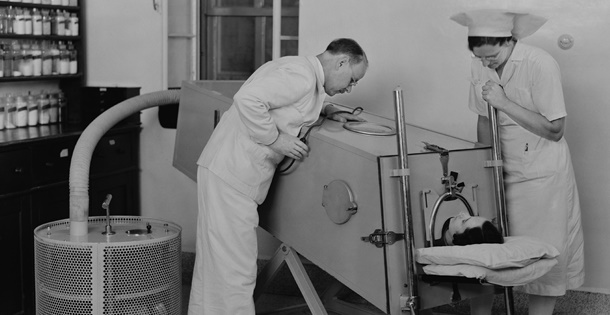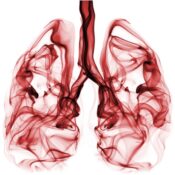I was 1 year old in 1949 when polio struck our family. As I grew up and could understand why my mother was in a wheelchair, she told me about her time in the hospital. She said that late at night she often lay awake listening to the rhythmic pumping of the iron lungs on her polio ward, and to the whooping cries of babies infected with pertussis that echoed down the hospital’s corridors.
Paralyzed from the neck down, she was one of many polio patients in that hospital. This scene of paralyzed polio patients in iron lungs and of pertussis babies struggling to breathe was repeated again and again in hospitals across the country. That year there were more than 40,000 cases of polio and almost 70,000 cases of pertussis in the United States.
In some ways, my mother was one of the lucky ones. She left the hospital alive. And though she had no use of her legs, limited use of only one arm, and limited breathing capacity, she could breathe on her own. Some of her less fortunate friends had to go home in their iron lungs. When the Salk polio vaccine became available in 1955, my mother made sure that my brother and I lined up to get it. And when the Sabin oral polio vaccine came along, we got that too. It’s not that my mother rushed us to the doctor for all the latest treatments; we were rarely in a doctor’s office. But my mother knew all too well the value of immunizations.
My mother was 50 when she died from complications of polio. One year later, I was in an immunization line at boot camp. The military didn’t waste time with which recruits had previously received immunizations. We just got them all. Apparently the military and Mom saw eye-to-eye.
After the service, I used my GI Bill to go to college and to medical school. By this time, widespread immunization had all but eliminated polio and pertussis in the United States, but other severe infections were still common. We regularly saw children with bacterial meningitis and with epiglottitis—a frightening infection that can rapidly result in airway closure and suffocation. Now with the development of new and safer vaccines, bacterial meningitis is rare in childhood, and most newly trained doctors have never seen a case of childhood epiglottitis. However, outside developed countries, the burden of vaccine-preventable death and disease remains staggering. Despite significant progress worldwide, 2 to 3 million children under age 5 die each year from diseases that could be prevented.
The success of immunizations in the United States and other developed countries has had unintended consequences. Many people no longer understand the value of immunizations. Not exposed to the death and suffering that were common prior to vaccines, they have come to view vaccines with suspicion. At best, they may see them as having significant risk and little benefit. At worst, they may regard them as a sinister plot forced on a naive public by misguided doctors and greedy drug companies. But while it is true that everything we do in medicine, including administering vaccines, has risk, there is nothing else that provides such an over whelming benefit with so little harm.
So I continue to be saddened when I see a child who suffers or dies from a disease that could easily have been prevented by a routine immunization. Still, I do not fault the parents. Having no personal experience with vaccine- preventable diseases, and with exposure to an ongoing misinformation campaign by a small but vocal group of vaccine opponents, they make the wrong choice.
I also understand when parents blame immunizations for other conditions that strike their children, such as autism. Though multiple studies have shown no link between autism and vaccines, and both the Institute of Medicine and Centers for Disease Control have gone on record stating that the evidence does not support such a link, parents desperately searching for the cause of their child’s affliction still may blame the vaccines. After all, they see the signs of autism develop only after their child has received multiple vaccines.
But autism is also recognized after a child has had breast milk or formula; after a child has ridden in a car seat; after a child has been exposed to televisions and other electrical appliances; and after a child has had a host of other experiences common to early childhood, including immunizations. No matter how well-intentioned, blaming vaccines for autism is like convicting the wrong person of a crime. Not only does it unfairly condemn the innocent, it stops any attempt to find the true culprit. It also threatens to allow the reemergence of multiple devastating and life-threatening infectious diseases.
So I do my best to explain to parents the true value of vaccines. But sometimes the message just doesn’t get through. At those times I wish Mom were here to help me. Somehow I think that she could help these parents understand.
Dr. Leonard is an author, teacher, and specialist in both preventive and emergency medicine.
Become a Saturday Evening Post member and enjoy unlimited access. Subscribe now




Comments
Although I was not alive to remember the Polio outbreaks of years gone by, I remember the story my mother told us of her brother’s battle with polio, acquired when given a live vaccine. Their house was quarantined, her brother was taken off to a city hospital, alone to die, and they were shunned by their small town for many months afterwards. The improvement of vaccines and the availability to all is something we have come to take for granted. We shouldn’t!